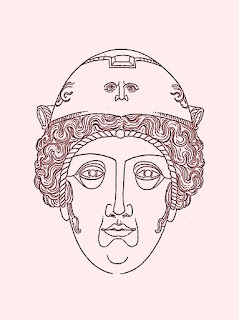There were various types of masks in the classic Greek comedy. The masks with the smiling faces were for the comedies and the sad masks for the tragedies, The actors were chosen by the State, not by the Comic poet. The poets were using pseudonyms or nick names sometimes. Aristophanes did so too.
The first three Comedies of Aristophanes-the Banqueters, the Babylonians, and the Acharnians were all brought out in the name of Callistratus; the name of Philonides does not make its appearance until several years later, namely at the Lenaean festival of B.C. 422. Of the eleven extant conledies three-the Acharnians, the Birds, and the Lysistrata-were certainly produced in the name of Callistratus; one, the Frogs, in the name of Philonides; and five-the Knights, the Clouds, the Wasps, the Peace, and the Plutus-in the name of Aristophanes himself. We are not told in whose name the Thesmophoriazusae and Ecclesiazusae were produced.
A scholar said that "For there was a law among the Athenians, that no person under 30 years of age should recite a drama in the theatre or speak in the public Assembly. In obedience to this law therefore the poet, not being yet 30 years of age, recited to the theatre through the agency of Philonides and Callistratus the Comedies he had himself composed." Now if this statement were correct, Aristophanes must have been over 30 when, in 424 B. c., he exhibited the Knights in his own name, and over 27 when, three years earlier, he exhibited the Banqueters in the name of Callistratus. But there is no evidence of such a law fixing the age at which, and not before which, an Athenian citizen was qualified to compete at the Dionysian festivals.
Could you imagine Aristophanes taking part in the competition disguised with a tragic mask?
First Translations of Aristophanes plays from Greek to Latin.
The first Latin translation was that of Andreas Divus, published
without the Greek text at Basle in the year 1539. It was a translation of all the eleven Comedies into Latin prose. No doubt the translator expected by his laborious undertaking to earn the gratitude of all subsequent students of Aristophanes; but his translation has been everywhere received with a chorus of derision and abuse. This unfortunate venture was followed, towards the close of the sixteenth century, by two partial translations into Latin verse, both of remarkable excellence. Florent Chretien, the tutor of Henry IV of France, published the Wasps, the Peace, and the Lysistrata as separate plays. The original edition of the Peace, was published at Paris in the year 1589. And in 1597 the Acharnians, the Knights, the Clouds, the Frogs, and the Plutus were published by Nicodemus Frischlin at Frankfort, in one volume, dedicated to the Emperor Rodolph II.
Each translator gave the Greek text by the side of his translation, and in each version even the most complex choral odes are given in the identical metres of the Greek, with (especially in the case of Florent Chretien) extraordinary skill and felicity.
But the first complete edition of Aristophanes which contained a Latin translation of all the eleven plays was that of Aemilius Portus in 1607. He gave the verse translations of Florent Chretien and Frischlin, and for the three Comedies which they had left untranslated-the Birds, the Thesmophoriazusae and the Ecclesiazusae-the prose translation of Andreas Divus.
This arrangement was continued in the editions known
as Scaliger's and Faber's but in the latter was added the Ecclesiazusae with commentary and Latin prose translation by Le Fevre from whom the edition derives its name. And Andreas Divus was finally shelved by the translation or the Birds by Hemsterhuys and of the Thesmophoriazusae by Kuster. Kuster's own edition (in 1710) contained the eight verse translations by Florent Chretien and Frischliu and the three prose translations by Le Fevre, Hemsterhuys and himself. Bergler turned into excellent Latin prose the eight Comedies translated in verse by Florent Chretien and Frischlin; and his edition, published after his death by Burmann, was the first to contain a complete translation of all the eleven Comedies in Latin prose.


